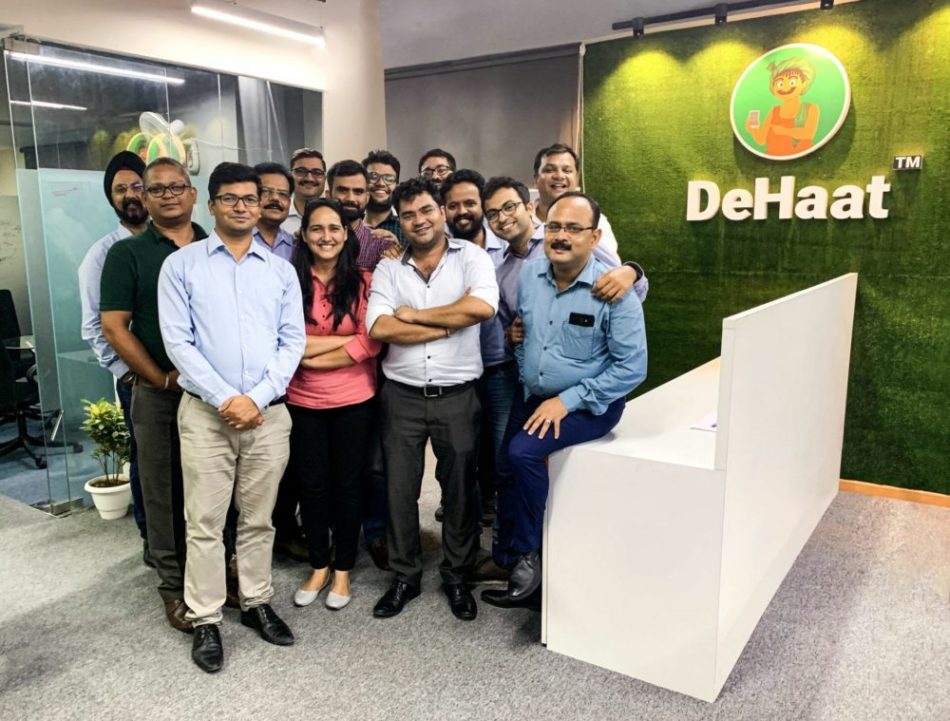Indian agribusiness marketplace DeHaat has raised $30 million in Series C funding, with new investor Prosus Ventures — the VC arm of South African internet giant Naspers — leading the round.
Also investing in the startup for the first time was London-based VC firm RTP Global. Existing investors including VCs AgFunder, Omnivore, and Sequoia Capital, and Dutch development bank FMO, also participated. [Disclosure: AgFunder is AFN‘s parent company.]
Patna-based DeHaat operates what it calls a “full-stack” online agribusiness platform, which farmers can use via a mobile app or by calling a toll-free phone number.
Upstream, it helps smallholders access inputs, advisory services, and equipment; downstream, it aggregates their produce, helping them to sell to commodities traders, retailers, and other buyers.
To link these different parts of the value chain together, DeHaat has also recruited an army of ‘micro-entrepreneurs’ to handle last-mile logistics, including delivery of inputs and collection of produce. By doing this the startup creates addtional jobs for rural communities; in many cases, the farmers themselves, or their family members, sign up to become micro-entrepreneurs to supplement their income.
As any AFN readers following the Indian market will know, DeHaat is far from alone in offering an ag marketplace platform in the country. Nevertheless, founder and CEO Shashank Kumar believes that there’s plenty of white space for his startup to flourish – particularly given its holistic approach to farmer-focused services.
“India is a huge market, where you have more than 130 million farmers, and a total [agricultural] market value of $400 billion. So the country has an appetite to accommodate many players,” he told AFN.
“But [DeHaat] is the largest ‘full-stack’ player. So far, most of the [other ag marketplaces] are either services-specific, or crop-specific; only on inputs, only advisory, only mechanization, or only output – and within that, handling just a few categories. But we are service-agnostic, crop-agnostic, and more farmer-centric.”
DeHaat has an “exhaustive” advisory database covering 32 of India’s most commonly farmed crops, and sends its users customized advice each week. According to Kumar, the startup’s “net monthly time” spent advising farmers averages in at 650,000 minutes. Smallholders buying inputs for their farms make more than 10,000 orders via DeHaat every day, with most large agribusiness players selling on the platform, he said.
At the downstream end, over 600 bulk-buyers of produce are active on the platform, which aggregates about 630 metric tons of produce each day.
For Kumar, it’s these kinds of impressive numbers that helped get big-ticket investors like Naspers and RTP on board, even in the midst of the Covid-19 crisis.
“During the evaluation process, they realized as a team we have very deep understanding of this sector, and a deep understanding of our users’ psychology,” he said. “Because of the strong collaborations we have established with hundreds of corporates for inputs as well as outputs, that made them comfortable [with investing] because they believe in investing in potential market leaders.”
‘Comfort for incoming investors’
DeHaat closed its $12 million Series B round in March 2020, just as Covid-19 was declared a global pandemic by the World Health Organization.
It seemed that startup investment would likely face some kind of squeeze due to the economic uncertainty brought on by the pandemic. DeHaat decided to take a proactive approach.
“That’s why, why right after that [Series B] round, we started talking to people,” Kumar said. “We had a bunch of inbound interest — it’s not like we were very actively chasing investors — but I was, with full discipline, talking care of all the inbound interest. Fortunately, we had quite a few [inquiries].”
He thinks that Covid-19 actually led to “more conviction for both parties,” making for a relatively smooth fundraise given the circumstances.
“By September, we had mostly closed the round. I think it was that little bit of foresightedness about when to start raising,” he said.
“At the same time, as an entrepreneur it gave me confidence because we had number of offers. Last but not least, the cap table of DeHaat [was already] amazing — with names like Omnivore, AgFunder, Sequoia — so that’s pretty welcoming and creates another degree of comfort for incoming investors.”
Farmer finance
In addition to strengthening its tech in areas such as mapping, machine learning, data science, and user interfaces, DeHaat will use the Series C funding to expand its geographical reach. Until now its customer base has been concentrated in eastern India, where it works with around 400,000 farmers.
“We want to replicate that [across] central and western India, which are equally important agricultural regions, and [expand] our network in terms of farmers and last-mile partners,” Kumar said.
DeHaat will also enhance its existing services for farmers and launch new offerings on its platform.
“Our goal is to bring everything related to ag under one roof for Indian farmers,” he said. “So far that has meant services like inputs, advisory, and market linkages. A few months ago we started financial services as well, offering access to credit, and we collaborated with several banks and financial institutions on that.”
The startup plans to build out its lending capabilities, as well as adding insurance and crop spraying to its roster of services.
“As an early investor in DeHaat, we’ve had the pleasure of watching Shashank and his team mature into formidable operators, able to evolve and adapt to respond to — and overcome — challenges such as we have seen with Covid-19. Their continued growth and the success of their Series C round is testament to this,” said Michael Dean, founding partner at AgFunder.
Got a news tip or a story idea? Email me at [email protected] or find me on LinkedIn and Twitter at @jacknwellis





